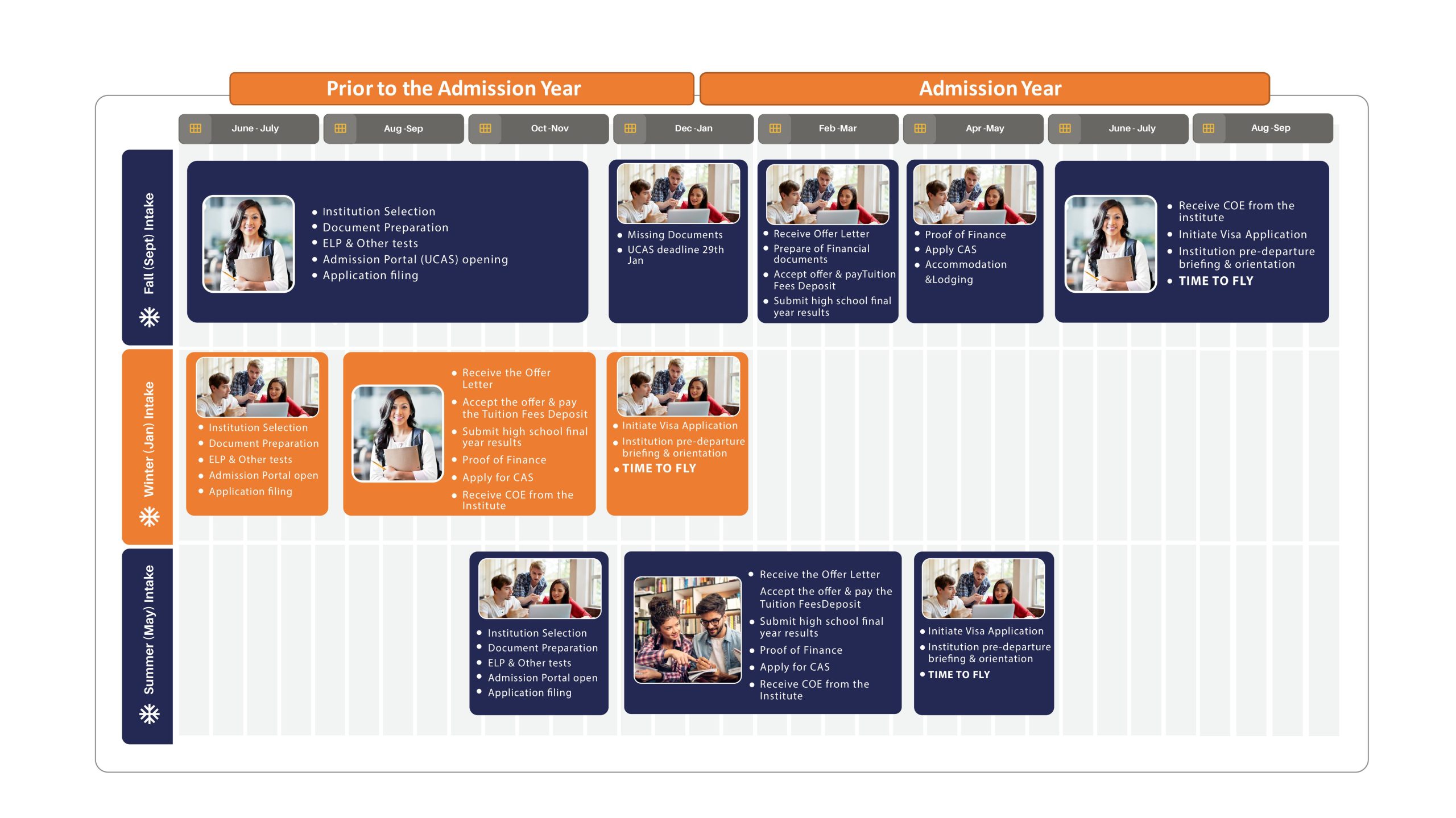STUDY IN THE UK
Study in the UK: Global Destination for Academic Prestige & Opportunity
The UK combines academic heritage with modern, career-driven education, making it a preferred destination for ambitious international students. With globally respected universities, innovative teaching methods, and strong ties to industries across Europe and beyond, the UK offers a dynamic environment to learn, grow, and thrive.

Start Your UK Journey
Fill out the form and our experts will contact you shortly
FACTS ON EDUCATION IN THE UK
of the world’s top 10 universities are based in the UK
(QS World Rankings 2024)
Contributed to the U.K. economy by international students in 23/24 academic year.
(House of Commons Library, 2024)
Students from 180+ countries enrolled annually.
(UK HESA, 2024)
Students originating from Asia, underscoring the country's global appeal.
(OECD Indicators, 2023)

WHY STUDY IN THE UK
An ideal mix of academic prestige, real-world skills, and multicultural exposure
- Home to some of the oldest and most respected universities in the world
- Globally recognised degrees with high employability value
- Shorter degree durations save time and costs
- Post-study work opportunities through the Graduate Route
- Focus on critical thinking, research, and independent learning
- Supportive student services and rich international student networks
UK
Life in the UK
Study in a country with a blend of tradition, modernity, and global perspectives

Economy
Ranked as the 6th largest economy globally (IMF 2024), the UK offers strong career pathways in finance, tech, healthcare, and sustainability.

Culture
A vibrant mix of history and innovation—home to 6,000+ museums, theatres, and cultural festivals. The UK embraces over 270 nationalities, creating an inclusive environment.

Healthcare
International students have access to the NHS, one of the world’s top-ranked public health systems. Over 95% of international students report satisfaction with NHS services.

Language
As an English-speaking country, the UK provides full immersion in the world’s most widely used business language. This helps students gain fluency, confidence, and stronger global career prospects.

Safety
The UK is Ranked among the top 20 safest countries globally (Global Peace Index), with dedicated university security and support systems.

Food
From classics like Sunday roasts and fish & chips to diverse global flavours—Indian, Chinese, Mediterranean, African and more—the UK is home to over 80 international cuisines.

Transportation
One of Europe’s best-connected public transport systems. The UK has over 2,500 railway stations and efficient urban networks across cities.
COST OF EDUCATION
Invest in globally recognised education with long-term value
Tuition Fees
- Undergraduate: £11,400–£38,000/year
- Postgraduate: £9,000–£30,000/year Accommodation
Accommodation
- On-campus: £664–£848/month
- Private rentals: £554–£750/month (excluding utilities)
COST
Cost of Education
- Tuition Fees: CAD 14,000–80,000/year (undergraduate), CAD 15,000–70,000/year (postgraduate)
- Accommodation Costs: CAD 3,000–7,000/semester (on-campus), CAD 900–2,700/month (off-campus)
- Living Expenses: CAD 1,200–1,800/month
- Health Insurance: CAD 600–1,000/year
- Miscellaneous Costs: CAD 2,500/y
ACCOMMODATION
Diverse and Affordable Accommodation Choices to Suit Every Student’s Lifestyle

On-Campus Housing
Many universities offer on-campus residences with various amenities, providing convenience and fostering a strong sense of community among students.

Off-Campus Rentals
Renting an apartment or sharing a house off-campus offers more independence and flexibility. Students can find listings through university housing offices or local rental websites.

Homestays
Staying with a Canadian family offers a supportive environment and a unique opportunity to experience Canadian culture and daily life firsthand.

Student Residences
Private student residences are available in many cities, offering a range of services and facilities designed for student living.
University-Managed Housing
Ideal for first-year students—includes internet and utility bills, usually located within walking distance of campus. Offers shared or private rooms and opportunities for social interaction.
Private Rentals
Shared flats or houses provide more independence. Students handle their own bills, but it offers flexibility in choosing roommates, locations, and budgets.
Purpose-Built Student Residences
Modern, fully furnished housing designed specifically for students. Often includes gyms, study areas, and events to promote community living.
Short-Term Options
Temporary stays in homestays, serviced apartments, or hotels are useful during the initial transition or when arriving ahead of the academic term.
Skills
Skills In Demand
Graduate into globally competitive careers across dynamic and fast-growing industries
Healthcare and Life Sciences
Artificial Intelligence and Cybersecurity
Finance & Insurance
Education and Public Sector
Renewable Energy and Engineering
Creative Industries and Digital Media

Skills In Demand
Canada’s job market is rapidly evolving, with industries actively seeking professionals equipped with specialised and modern skills.
- Technology, AI, and Data Sciences
- Healthcare and Biotechnology
- Engineering and Project Management
- Sustainability and Environmental Sciences
- Business and Financial Services
Partner
Partnering with UK’s Top-Tier Institutions













FAQs
Answers to Parents’ and students’ most asked queries
Yes, many UK universities offer institution-specific scholarships based on different criteria. These include:
- Academic or merit-based scholarships for students with strong academic achievements.
- Performance-based scholarships for talents in sports, music, or the arts.
- Subject-specific scholarships offered by departments for certain courses.
- Equal access or sanctuary scholarships for refugees and asylum seekers.
- Disability scholarships for students with disabilities or special needs.
It’s best to check individual university websites or platforms like Postgraduate Studentships and Prospects for detailed listings.
Yes. If you hold a valid UK Student Visa, you’re allowed to work part-time—up to 20 hours per week during term time and full-time during holidays. Some degree programs also include internships or placements that help you gain practical experience in your field.
Entry requirements differ depending on the university and the course. Generally, students need to submit:
- Academic transcripts
- Proof of English language proficiency (such as IELTS, TOEFL, or other accepted tests)
- A personal statement
- Letters of recommendation
Some courses may also require portfolios, interviews, or additional assessments.
Yes. International students need a UK Student Visa (formerly Tier 4). To apply, you must receive a CAS (Confirmation of Acceptance for Studies) from a licensed university or institution, and meet financial and language requirements.
The main intake is in September/October, while some universities also offer January/February starts. It is advisable to apply 6–12 months in advance to allow time for admission, visa application, and pre-departure preparation.
Yes. The Graduate Route Visa allows students to stay in the UK for up to:
- 2 years after completing a bachelor’s or master’s degree
- 3 years after completing a PhD
This gives graduates time to work or look for jobs related to their field.
Yes. Most UK universities require proof of English proficiency through tests like IELTS or TOEFL. However, some institutions may accept alternatives like PTE Academic, Cambridge English qualifications, or school transcripts from English-medium education systems.
Yes, international students who pay the Immigration Health Surcharge (IHS) as part of their visa application are entitled to access the NHS (National Health Service) during their stay. This includes doctor visits, hospital treatments, and emergency care.
UK universities offer comprehensive support including:
- Academic support (tutoring, writing centres, language assistance)
- Personal support (mental health counselling, student advisors)
- Career services (CV guidance, internships, job fairs)
- International student offices that help with settling in, housing, and cultural adaptation
HAPPY CLIENTS, HAPPY US
Listen to what our happy and satisfied clients say about us
GET IN TOUCH
Get In Touch With Our Team of Expert Counsellors
Study Destinations
Choose from 14+ Leading Study Destinations
Study in
Canada
Study in Canada
Study in
USA
Study in USA
Study in
Australia
Study in Australia
Study in
New Zealand
Study in New Zealand
Study in
Ireland
Study in Ireland
Study in
UK
Study in UK
Study in
Germany
Study in Germany
Study in
Asia
Study in Asia
Study in UK from UAE
Why Select Glinks International as Your UK Education Consultant?
As you choose to study in the UK as a UAE national, a UK education consultant can either lead to a stressful and confusing journey, or it can be a successful and smooth sailing into your dream university. Glinks is the most popular global education consultancy, which is famous because of its enormous experience and reliable advice and has grown and made its name the largest and most experienced consultancy in the UAE. Glinks has increased through 15 plus years of experience, adding to the many years of trust building to assist the students planning to study in uk from UAE to be guided and aided culturally to meet the specific needs of the Middle Eastern students. The best thing that makes Glinks a premier education consultant in the UK is their tremendous track record. Their excellent 95 per cent success rate in securing the student visa is an attestation of their great track record. This high success rate shows that the consultancy has a comprehensive knowledge of the requirements in studying in UK and its carefulness in carrying out applications and visa processes.Educational Performance That Makes Your Qualifications Stand out.
The first one is the interesting fact that to have a UK degree on your list of skills and talents is as good as having a golden passport to success in your profession. The best UK universities like Oxford, Cambridge, Imperial College London, and the London School of Economics are not just learning institutions but are mythical places that have produced Nobel-winning scientists, political figures, and even radical scientists and Glinks has a host of other university and course choices.Opportunities for fast career development.
The United Kingdom is the sixth-largest economy in the world, based on the International Monetary Fund 2024 ratings. This financial strength is directly converted into a significant opportunity in the field of finance, technology, healthcare, and sustainability. It doesn't matter whether you are doing an undergraduate or a master degree in UK, you are focusing yourself at the centre of international business and innovation.Academic Preparation: Showing Your Academic High Achievement.
For Undergraduate Programs: The UK requirements of undergraduate admission include, as a rule, high school transcripts of good academic achievement, standardised tests where applicable, compelling personal statements of your reasons and your fit, and recommendation letters of teachers who can attest to your abilities and personality. For Your Master Degree in UK: UK requirements in postgraduate study usually consist of a bachelor's degree in a recognised field, a transcript of ongoing academic development, research proposals or purpose statements detailing your academic or professional interest, professional references or academic references and in some cases, portfolios or work samples showing demonstrations of your practical skill. The UK education consultant at Glinks has a close understanding of what the admission committees of the best universities in the UK are interested in in the applications. They also help in preparing documents, submitting applications, and making follow-ups so that a smooth process is made and your qualifications can be placed strategically to have the best chances of acceptance.English Language Proficiency: Linguistic Competence Establishment.
Most universities demand written evidence of proficiency in the English language by administering standardised tests to most of them. The most common tests are IELTS, TOEFL, PTE Academic and Cambridge English qualifications; however, other institutions will accept other documentation as long as you have undergone past training in the English medium of instruction. In case the students intending to study in UK are based in The UAE, your UK education consultant at Glinks would recommend the best preparation courses and testing strategies that best suit your target leading universities in UK. Most of the institutions would have a minimum IELTS score of between 6.5 and 7.5 based on the course and level of study.Scholarship Support and Financial Requirements.
Financial viability is also an important aspect of the study as required by UK. The potential students need to show an ability to meet tuition fees and the cost of living over their period of study. Glinks offers numerous services such as free academic services, profile designing, career guidance, scholarship, housing and travel services. Glinks assists in finding possible scholarships and also aids in the application in order to increase the possibility of receiving financial aid. This is a full scholarship program that can greatly help in alleviating the cost of taking your master degree in UK or an undergraduate course.Student Visa Requirement: Obtaining Your Entry Visa.
A UK Student Visa is required by international students who want to study in UK. However, there are a series of vital papers required during the application: Confirmation of Acceptance for Studies; a licensed institution, a valid passport with sufficient validity period, documented English language proficiency, full financial evidence, tuberculosis test results for candidates of certain countries, visa application fees and Immigration Health Surcharge. Your UK education consultant at Glinks is your priceless source during this process. Glinks assists in the whole process of visa, such as completion of applications, financial statements and guidance and training in mock interviewing. This thorough planning simply adds up to the high visa success rate of 95 per cent of Glinks.Life as an international student when you study in UK.
Knowledge of what to reasonably expect when you study in UK helps in better preparation and maximising your international education experience. Your Glinks education consultant in the UK provides you with all the preparation needed in this transition. Accommodation Choices: Creating a Home that You Would Like.- On-Campus Residences
- Off-Campus Housing
- Purpose-built Student Accommodations.
Access to Healthcare: Full Medical Insurance.
International students who pay the Immigration Health Surcharge during their visa processing are entitled to access to the National Health Service during the duration of their stay in the UK. The NHS is one of the best global systems of public healthcare, and more than ninety five percent of international students indicate that they are satisfied with NHS services. This covers general practitioner visits, hospital visits and emergency health services, which will ensure that you are confident during your studies in UK.Part-Time Employment Opportunities: Academic-Professional Development.
Valid holders of UK Student Visas are allowed to work part-time of up to twenty hours per week during term times and full-time during holidays. This presents great chances to work, earn and boost personal finances, work as a professional, and create local networks. Most degree programs also facilitate internships or placement programs, which allow the students to have industry-specific knowledge which is directly related to their subjects.Timeline Application to Study in UK with Glinks.
Applications to study in the UK through the UAE must be well-timed to be successful. Your education consultant at Glinks in the UK takes you step-wise through the process, without missing any of the deadlines or requirements in your desired choice of top UK universities.- Research
- Application
- Final Decision
- Visa Procedure
- Pre-Departure Phase (One to three months before)

